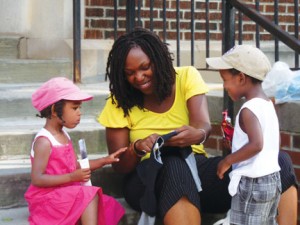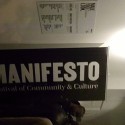Director Lana Lovell confronts stereotypes of single Black mothers
In her latest documentary, director and filmmaker Lana Lovell offers a glimpse into the lives of three Black mothers who step out from society’s pre-conceived shadows to go on record about raising children alone. Resilience: Stories of Single Black Mothers is Lovell’s exploration as much as it is her own experience.
Off-camera she poses provocative questions, uncovering a personal plight that’s echoed in more Canadian households than we realize. Lovell sat down with Sway to discuss Resilience, which is scheduled for a public screening and discussion on Oct. 23 at the University of Toronto Innis Town Hall cinema.
Sway: Why make a film about single Black mothers?
Lovell: I wanted a film that looked at the issue in a realistic way. I’d seen a number of films, documentaries and TV shows in which single mothers were represented and it was not truthful and could be harmful. I also was aware that the media portrayal of single Black mothers tended to be negative.
What were you thinking about in terms of stereotyping and the stigma?
That we live in a patriarchal society. Two hundred years ago, it was very important that women be in a marriage so that people could know who the father was. I think that kind of pressure and those kinds of norms continue today. That’s one of the main reasons for women being stigmatized about having children when they’re on their own — because what they are doing is taking control of their own sexuality.
It’s only when you have children that there’s this impression that you had sex. The child is proof. Unfortunately, Black women have become the group that’s targeted with, “Well, if you don’t adhere to our society’s norms and traditions, that is getting married and having a child in that relationship so that society will know whose child it is, you’ll have to do this alone. You’ll be poor.”
What were you looking for in the women that you found?
I was looking for women who were openly honest about telling their stories. I talked to a lot of women and most told me many interesting personal stories about their lives and challenges that they had overcome. But, unfortunately, they weren’t willing to do that on camera.
Why?
Some are private people. Some felt there was a bit of a stigma attached. It takes a certain amount of courage to open up your life and your home to a camera crew. You don’t know what they’re going to do and how they are going to portray you. So I was very lucky to get the three women that I did: Nancy, Simone and Gloria.
There’s stigma and then there’s glamorizing single motherhood. The Oscar-winning film, Juno, was accused of doing that. What does it mean to glamorize single motherhood?
Some of the women I talked to planned it. In one case, a 17-year-old woman and her boyfriend did. Then she got sick during her pregnancy and couldn’t keep her job. He lost his. She was in a one-bedroom apartment. They lost the apartment and she had to move into a one-room in another place. He was too young, she was too young. But we don’t really talk about emotional consequences. There are a lot.
Nancy, one of the women featured, had a good foundation with all her resources and friends, and she was still overwhelmed. The public only sees films like Juno or TV shows that make it seem easier than it is. Remember, in this society we have 50 per cent of marriages ending in divorce, so as a woman you need to be in a position to look after your child.
Befriend Sway on Facebook
Sway with us on Twitter








Leave your response!